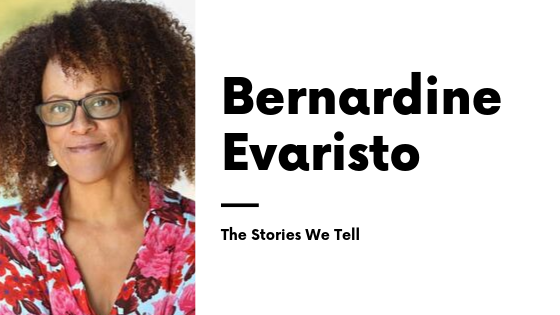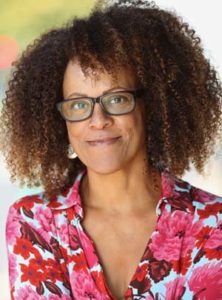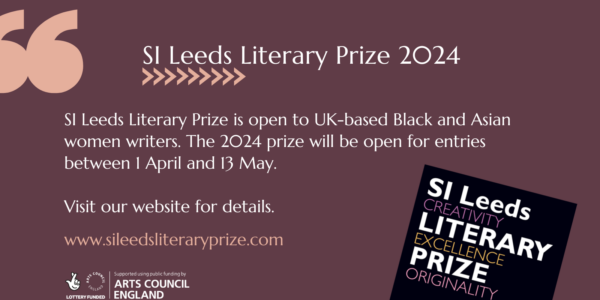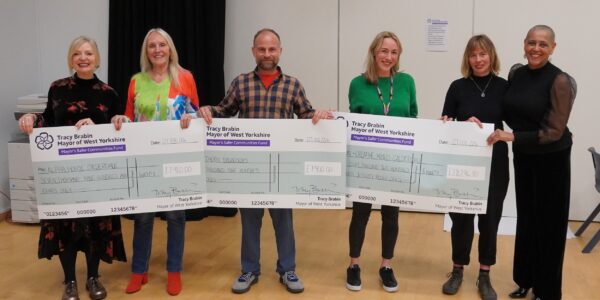Bernardine Evaristo – The Stories We Tell
01 Oct 2019 / The Stories We Tell

These Things I Know
During my career I have often felt like the snail overtaken by many hares. I didn’t win full-on media attention until I published my third book, The Emperor’s Babe, in 2001 and I’d been writing professionally, first for theatre, since 1982. I never stopped writing because I found it deeply nourishing and rewarding, and I loved being a voice in the world through my creativity. I had to dig deep and build self-belief because, like talent, it also has to be nurtured. I took personal development courses. I listened to motivational tapes. I eventually became unstoppable. If writers want life-long careers, they need to be unstoppable.
Over many decades of teaching creative writing students, I have found that those with the strongest commitment to developing their craft are the ones most likely to succeed, and by this I mean those whose writing improves to the point of publication and beyond. The quiet, hardworking student committed to learning often overtakes the ostensibly talented student who seems to effortlessly produce quality writing, is sometimes overpraised, and consequently doesn’t work at developing their skills.
Talent is a seed that needs to be watered. If it grows easily without effort, it can end up neglected and even wither completely. We all want to be praised, but praise can sometimes be the worst form of encouragement. As a young writer, I was mainly encouraged by my peers, or at least enough to know how my work was being received by them. We grow more as writers through constructive criticism. To this day I rely on my editors at Hamish Hamilton-Penguin to critique my work prior to publication.
As storytellers we are always apprentices to other writers through reading or taking in performed forms of writing. This is how we absorb and learn about literature and become creators of it ourselves. Writers of books are readers first, last and always. Playwrights have to see theatre in action. Spoken word artists – hello? Screenwriters – ditto. I have been an avid reader since I was first able to understand sentences. Reading was my conduit to the world outside my own little suburban life, and today it is how still I deepen my connection to the interior and exterior lives of others. A lot of my reading is for work, to review, teach or judge, and sometimes it’s an ordeal. When I love a book, I find reading incredibly pleasurable. It satisfies my soul and enriches me.
All literature helps me become a better writer, either by setting an example, or showing me where the weaknesses in fiction might lie. The books I love pay attention to three of my own core elements as a writer – language, structure and character. My favourite books are where writers pay attention to the flow and textures of their sentences. They’re the writers who create their own unique narrative structures, and for whom character, human behaviour and psychology reign supreme. Clunky or pedestrian sentences, thin or clichéd characterisation, and predictable plotting bore me. I’m also always looking for new and original ways of seeing the world and some magical, undefinable quality that makes a work of literature soar and sing.
Where you come from – your education, childhood, environment, relationships, education, cultures, pathways and identities through life – have made you the writer you are or are becoming. They are the magic ingredients inside your personality and character through which your creativity emerges. Whatever you feel about yourself, whatever has happened to you in your life, the decisions you’ve taken or those which have been made for you, your background, ethnicity, creed, culture, sexuality, gender, your whole life – it is the wellspring of your unique creativity. We cannot change the past, but we can accept it for what it was and know that we are writing because of it.
I grew up in a mixed-race English-Nigerian household in a then white area of London where my family were seen as rank outsiders and vilified because of it. This has been instrumental in shaping my creative choices as a writer all my adult life, and I wouldn’t change it for the world because it made me the writer I am. Own who you are, and know that you are using your background, intentionally or not, to write from your own unique perspective.
The imagination and ideas are muscles which improve the more you use them. Think champion swimmer. Think language learning. Think cooking and gardening. Think Nobel laureate scientist. Everyone has an imagination, and ideas are floating all around us. They need to be harnessed and cultivated into our own transmutations and developments of them. I will never run out of ideas because I have spent my life generating them. In fact, I have too many ideas and sometimes find it hard to settle on just one. A new book has been percolating inside me since the day I signed off on the final proofs for my new novel Girl, Woman, Other in February 2019. My mind has been an ever-growing morass of ideas ever since, which I have to write down as notes, knowing I will return to explore them further at the end of this year. Next year, when I start writing the new book, I’ll test them out and see which ideas excite me the most. I tend to experiment as a writer and take risks, so what excites me most will be those ideas with the potential to stretch the boundaries of form and which feel the most adventurous.
Writers are craftworkers. We slowly build our pieces of writing until they feel complete. My novels might go through four full drafts, but each sentence, phrase, or paragraph, will go through multiple drafts before I ever reach the first full draft stage. What do I mean by multiple? 10, 20, 30 drafts, until the changes are tiny, until I’m tinkering with punctuation, until it feels done. Readers see the finished product and might imagine the work was easy to write, right? You start on page one until the novel is finished and that’s it. Nothing could be further from the truth, for me, at least. I do hear of other writers banging out novels at supersonic speed. However, aspiring writers will quickly learn the adage that ‘writing is rewriting’.
I love rewriting. First there is the often-ecstatic creative flow, then comes the hunkering down and chiselling away to shape the raw material. Girl, Woman, Other took five years to write at my workbench. I write on the screen, print up and mark on the page. Most of my undergraduates don’t have printers and many of them refuse to use the available ones in the university library. I implore them to do otherwise. Sometimes they write on their phones and email it to me as homework without revision. I can tell. Seriously. Computer screens of all sizes are very deceptive. The font on the screen looks glossy, professional, finished. However, once it’s printed up, its failings become evident.
Be reassured that your writing can be developed beyond your wildest imaginings if you put in the hours, are receptive to informed feedback, and are prepared for the long road ahead. Let me rephrase this in case it sounds ominous: if you are prepared for the exciting journey into your creativity that awaits you to fill the space.
Creative people need to honour their talent or it rots away inside us. I’ve known people who left the arts in their twenties only to deeply regret it by their forties. Not that it’s ever too late to re-engage or pick up an artistic practice. We can pick up writing at any age or stage in our lives. I’ve never regretted the choice to stay in the arts, even though it meant a financially impecunious and precarious existence for a lot of my career. I was very used to never knowing at the start of the year whether I was going to be able to support myelf at even the most basic level – accommodation, food, transport, or the rest of it. I know this would terrify most people, but it was how I lived my life and I was very used to it. I was never supported by a partner or relied on family largesse because my family had no money. Eventually this changed and I became a salaried person as a university professor of creative writing, but it took about three decades.
I have seen aspiring writers defeated by a rejection that is inevitable for most of us at stages in our writing careers. Either you are crushed by it and stop writing, or it deepens your resolve to improve your skills and stories and get your work out there. Resilience is one of the most important qualities for a writer because it means that you will develop the inner resources to keep going through all the challenges life has to throw at you, and a life in the arts can be rocky, to say the least. Instant success doesn’t prepare people for the obstacles ahead. You only you know the extent of your resilience when it is tested, when your dreams and plans are thwarted and you still resolutely refuse to give up.
If publications, or productions, or performances don’t materialise, and writing is your passion, then just do it, even if it’s for yourself, a few friends, your own writing group or showcase, a blog, self-publication. Perhaps one day you’ll reach a wider readership, if that’s what you desire. Perhaps at some point you’ll realise that you don’t feel passionate enough about writing and give up because you’ve fallen out of love with it or you’ve found another art form you prefer, or realise you were seduced by the apparent glamour of being a writer and the reality doesn’t match up. I tell my students to bounce back, not when they’ve fallen, but as soon as they feel themselves in the act of falling. I do this myself all the time and resort to PMA – a Positive Mental Attitude. I talk myself out of whatever has upset me in my professional life – rejection, marginalisation, perceived snubs and snobbery. One day, I tell myself. One day.
Find out more about The Stories We Tell.
 Bernardine Evaristo is the award-winning author of eight books of fiction and verse fiction including Girl, Woman, Other (Penguin 2019), a polyvocal celebration of black British womanhood, which is shortlisted for both the Booker Prize 2019 and the Gordon Burn Prize 2019. Her other books include The Emperor’s Babe, Lara, Soul Tourists, Blonde Roots and Mr Loverman (2013). Two of her books have been adapted into BBC Radio drama. Her writing explores the African diaspora: past, present, real, imagined, and she is known for her experimental writing. Evaristo is also a literary critic, has sat on many prize juries, and she is Professor of Creative Writing at Brunel University London. She has founded and co-founded several arts inclusion projects including Theatre of Black Women in the 1980s, Spread the Word in the 1990s, The Complete Works poetry scheme in the 2000s, and the Brunel International African Poetry Prize in 2012. She is a Fellow of the Royal Society of Literature, and its current Vice Chair; a Fellow of the Royal Society of Arts; and a Fellow of the English Association. She was appointed an MBE in 2009.
Bernardine Evaristo is the award-winning author of eight books of fiction and verse fiction including Girl, Woman, Other (Penguin 2019), a polyvocal celebration of black British womanhood, which is shortlisted for both the Booker Prize 2019 and the Gordon Burn Prize 2019. Her other books include The Emperor’s Babe, Lara, Soul Tourists, Blonde Roots and Mr Loverman (2013). Two of her books have been adapted into BBC Radio drama. Her writing explores the African diaspora: past, present, real, imagined, and she is known for her experimental writing. Evaristo is also a literary critic, has sat on many prize juries, and she is Professor of Creative Writing at Brunel University London. She has founded and co-founded several arts inclusion projects including Theatre of Black Women in the 1980s, Spread the Word in the 1990s, The Complete Works poetry scheme in the 2000s, and the Brunel International African Poetry Prize in 2012. She is a Fellow of the Royal Society of Literature, and its current Vice Chair; a Fellow of the Royal Society of Arts; and a Fellow of the English Association. She was appointed an MBE in 2009.



